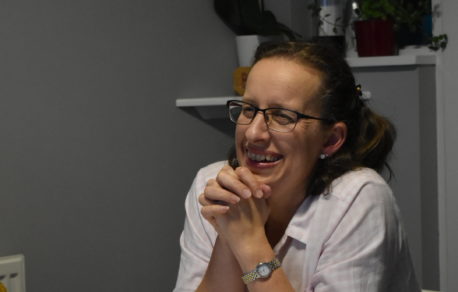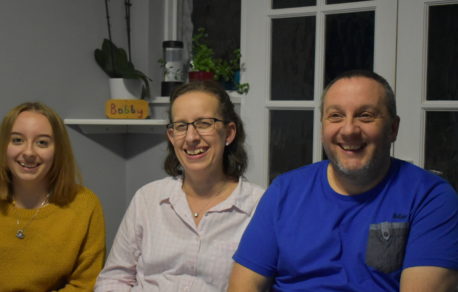
My journey as a neurodivergent engineer
As we celebrate the launch of our brand-new Engineering Neurodiverse Futures support programme, we invited our new Trustee Wolf to share his experience of being a neurodivergent engineer with dyslexia – as well as his words of advice for neurodiverse students navigating university life.
My experience of neurodivergence
My name is Wolf and I am a university dropout.
Until I got diagnosed with Dyslexia, I didn’t understand why things were so hard.
I was told that I was lazy, that I wasn’t trying, and it nearly broke me.
Today I speak to you as a Trustee of Foothold. But I also speak to you as someone who has been through the challenges that being neurodivergent can bring.
Neurodiversity is diverse, complex and misunderstood. The system often fails to spot problems early on, leaving students to pick up the pieces.
ADHD is underdiagnosed in women and autism overlooked in members of ethnic minorities. Contrary to popular belief, many students do get to university before it gets noticed. Their stories are fascinating.
In this post I will talk mostly about the university experience. Neurodivergence affects you in all walks of life, but few places have the sheer impact of academia. The intense coursework, exams, and assessment styles all create situations that are all-but-impossible to avoid.
In the workplace, I can choose tasks that play to my strengths rather than weaknesses, but during my degree, that was just not possible.
How neurodivergence gets discovered
During the January exams, or after the first graded assessments, some students inexplicably start failing.
There are reasons for this – some don’t do the work, some have suffered bereavement, but some seem to fail for no reason at all – when this happens, we might consider learning difficulties.
At the tail end of my degree, my tutor suggested that I might have dyspraxia. Her relative was recently diagnosed, and she thought the same for me.
This is a common pattern – lived experience means people attribute the symptom they see to the diagnosis they know.
I ultimately didn’t have Dyspraxia, but her comment did prompt me to see an educational psychologist.
In the context of university, neurodivergences are often called learning difficulties, illustrating the difficulties they cause in exams.
Once a learning difficulty is suspected, your first point of call is your university’s student support services. They can do preliminary assessments, help you get diagnosed and provide funding.
Back in my day, an assessment would set you back about £250, a big outlay for a student (I ended up paying out of my own pocket).
Many students get told that they must fund their own assessments, sometimes because they are international students and at other times because the university doesn’t have enough evidence. The latter is particularly distressing to me.
This is why Foothold now helps fund assessments for engineering students through the Engineering Neurodiverse Futures programme – we believe that means should not be a barrier to opportunity.
Life post-diagnosis
In the hours and days that followed my diagnosis, I called old friends and acquaintances, to explain why I had struggled throughout my school years.
Everything finally made sense and I could start processing what had happened. In my case, the damage had been done, and I didn’t have another fight in me, so I had dropped out.
But I ended up going to a different university, and eventually graduated with a more technical degree. Once I knew that my difficulties were because I used the wrong study techniques, it became doable.
Catching students early is important. Foothold works actively with universities to refer students in their first year.
Also, by raising awareness with careers advisors, personal tutors and others, we aim to leave a lasting impact – once the symptoms are known, the institution will keep helping students.
You will eventually graduate. Dyslexia brings many strengths – I see patterns, and understand systems. I struggle with dates, names and facts – my study techniques are all about remembering, since dyslexia often gives you a good understanding of the context.
In the workplace, I pair up with people who quickly fill in the blanks – together, we make quite the team.
Why the Engineering Neurodiverse Futures programme?
The stories that I hear are absolutely phenomenal – people whose lives are turned around by a single diagnosis. That’s why we are launching the Engineering Neurodiverse Futures programme today.
Sometimes we also help fix lasting damage through therapy and coaching, but many people, especially those still at university, only need that piece of paper.
“I have ADHD”; “I have Autism”. Three simple words that change lives.
I like to say that what we do here is give people three years of their lives back. Getting diagnosed so late was frustrating – why did no one notice? – and the cost is best measured in years lost. But things do turn around.
If this is you, take courage. You can still graduate, you can still get that job, you will succeed in life.
And if you know this person, as a tutor, friend, parent or teacher – help them. Point them to this article, point them to Foothold, and tell them that they will be all right.
Start #EngineeringYourWay today
If you’re an engineering student and you’ve been diagnosed or believe you may be neurodivergent, we can offer you direct tailored support through our Engineering Neurodiverse Futures programme to help you achieve your career goals and reach your full potential.
Find out more here.



